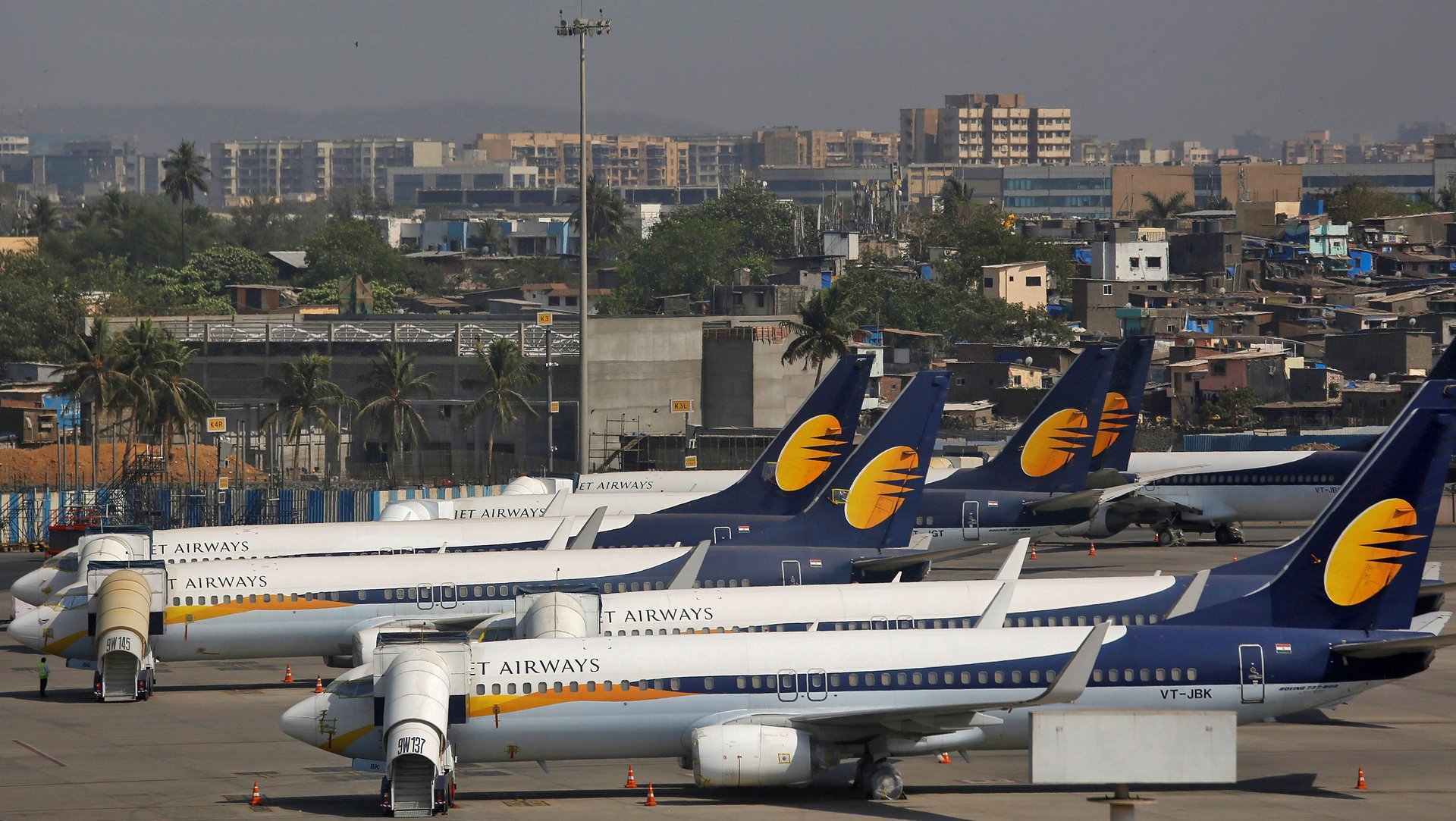Will India’s Jet Airways fly high again?
The decks have been cleared for India’s oldest private airline Jet Airways, which has been laden with debt, to fly high again.


The decks have been cleared for India’s oldest private airline Jet Airways, which has been laden with debt, to fly high again.
In October last year, a consortium of investors (pdf), including UK-based asset management firm Kalrock Capital and UAE-based businessman Murari Lal Jalan, took over Mumbai-headquartered Jet Airways, which has been grounded since April 2019. The airline flew long-haul routes to Europe, North America, Abu Dhabi, and Hong Kong. Before its financial woes, the airline operated 600 domestic and 380 international routes.
It’s possible that the airline could resume operations by the end of this year, after the National Company Law Tribunal (NCLT) approved a resolution plan by the Jalan Kalrock consortium on June 22. NCLT is a quasi-judicial body that deals with corporate disputes related to Indian companies. The consortium said that taking Jet back to the skies has been “extremely challenging yet satisfying.”
When will Jet Airways be back?
The new owners do not have any prior experience of operating an airline, but are confident of steering Jet back to the runway soon.
“If everything goes as per plan and the consortium receives the NCLT and regulatory approvals on time, Jet Airways would be back in the skies by the summer of 2021,” the consortium said in Dec. 2020. And now with one of the main hurdles being cleared, the spotlight will be on the new owners to see if they can actually walk the talk.
The consortium plans to revive the airline as a “full-time carrier,” with Jet Airways operating all of its historic domestic slots in India, and restarting international operations.
What does the resolution plan say?
Just like Jet’s first innings, the second incarnation of the airline’s hubs will remain in Delhi, Mumbai, and Bengaluru. There will also be smaller hubs in tier two and tier three cities.
“This would boost the economy in these cities, help Jet Airways stand back on its feet fast, and support the overall vision of the Narendra Modi government to promote aviation business through smaller cities in India,” the consortium said.
The consortium also plans to increase Jet’s footprint in the air cargo business, which they think is a market “currently underserved by any Indian carrier.”
The new owners had offered $53.5 million as startup capital, with another $87 million in the first year of operation, according to a report in The Times of India.
Will it be a smooth flight for Jet?
Now, the main obstacle to turbulence-free flight for Jet Airways is the allotment of flight slots. Rivals like Air India, IndiGo, and SpiceJet have taken over these slots since Jet’s grounding.
In its June 22 order, the NCLT has given the Director General of Civil Aviation (DGCA)—the industry watchdog—and India’s aviation ministry 90 days to re-allocate these slots and routes to Jet Airways. Before its grounding, the carrier had around 700 time slots, allowing it to land and take off from some of the busiest airports in India, including New Delhi and Mumbai. But the situation could change, experts say.
“It is unlikely that Jet may now be able to get preferential treatment at the major airports,” said Ashish K. Nainan, a Mumbai-based aviation expert. “They will have to go through the laid-down procedure and manage to get slots based on the routes they are planning to fly.”
Unfazed by all these concerns, Ashish Chhawchharia, head of restructuring services at Grant Thornton Advisory, which was appointed by the Kalrock-Jalan consortium, told NDTV that the airline will initially operate on 20 routes, with 20 narrow-body aircraft and five wide-bodied planes.
The new owners expressed a desire to retain old employees, and even plan to expand. “Given the pandemic and its impact on airlines, the new owners will not struggle with getting the workforce in place,” Nainan suggested.
Meanwhile, the market has already given a thumbs-up to the Jet Airways revival plan. After the NCLT approval, the share price of the airline locked in 5% upper circuit on June 22. The upper circuit is the maximum limit to which the company’s stock can move on a given trading day.
Jet Airways shares were quoting at 99.45 Indian rupees ($1.34), up by 4.96% on the BSE.